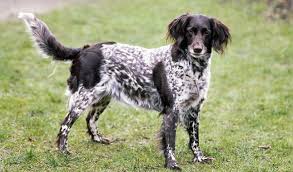The Small Munsterlander is a breed of dog uniquely capable of working together with a huntsman in all aspects of the hunt, from pointing to tracking to retrieving, both on land and in water.

Originating from the Munster province in Germany, der Kleiner Munsterlander, as it known there, is a breed thought to be at least 500 years old, with records dating back to the 13th and 14th century. These dogs had an excellent reputation of working closely with the hunter during the entire hunt, often being the deciding factor of wheter a meal was brought home at the end of the day or not. The slow decline of hunting for food and rise of recreational hunting during the 19th century meant that members of this breed became more and more adept at living in a home, resulting in todays Munsterlander being an excellent friend and companion.
The Small Munsterlander is a medium-sized, muscular dog, of about 19 to 22 inches (5256 cm) in height and between 32 and 58 lb (1526 kg). They are athletic, with a well balanced build showing both elegance and kindness. Their coat is of medium length, thick and lustrous, either straight and a little wavy. The color of said coat should be white with large, brown patches; ticking is also acceptable. Medium feathering on the tail, back legs and belly is also very common.
Due to their heritage and history, these dogs are very active and require at the very least one hour of exercise a day ideally hunting or something equally challenging. They call for regular, but basic grooming and show little to no cases of congenital diseases and conditions. This is a decidedly healthy dog whose rare issues are minor indeed (dry skin in wintry climates, etc). This is due to breeders' and owners' very strong commitment to the breeds health and well-being. The breeding programs are incredibly selective so as to yield strong specimens with good health and no temperamental issues.
Highly sociable, both with humans and other dogs, Munsterlanders require a strong hand and determined owner, lest they deciede to challenge him. Extremly intelligent, these dogs enjoy regular challenges and revel in pleasing their masters, especially with successful hunts. If left alone, with little to no exercise, they can begin hunting on their own. While they get along well with other pets in the house, even playing with them on a regular basis, they do not tolerate other animals in the garden or yard and are known to frequently chase the neighbours cat.
They exhibit stubbornness and require a gentle and patient trainer, but become indispensable to a hunter once they learn to work together, even looking for and responding to hand signals while pointing and tracking. They are also excellent swimmers, performing equally well both on land and in water. For those leading an active life, with plenty of outdoors time and most of all hunting, the Small Munsterlander can be an immensely loyal and able friend and ally.




